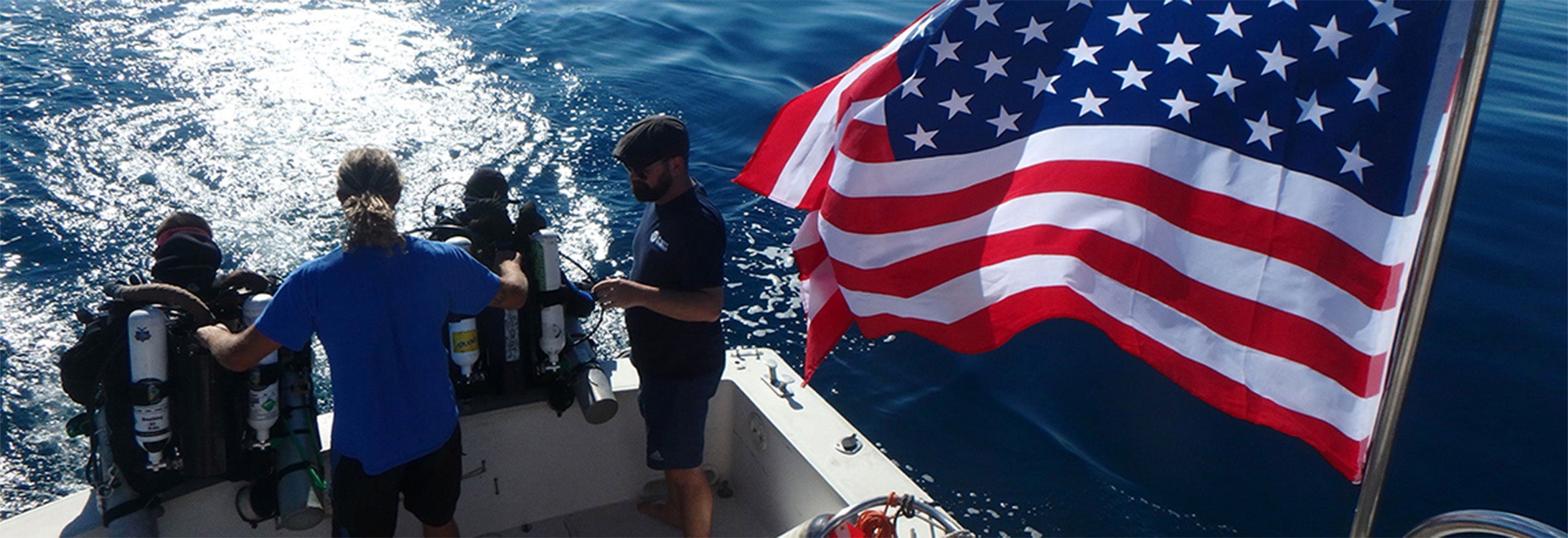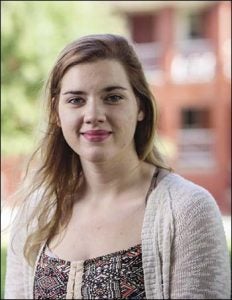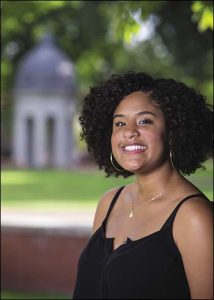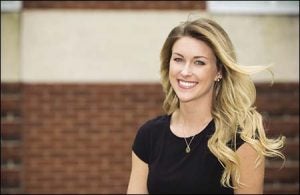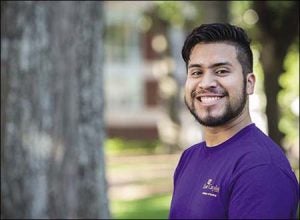COMING IN FIRST
ECU's first-generational college students set a standard for success
Nicole Blevins ’00 was halfway to East Carolina University with her whole family and her luggage in tow when it hit her for the first time: She was going to college.
“I said, ‘We have to pull over,’” Blevins recalls. “I needed to breathe. It was surreal.”
What was a natural next step for many newly minted college students was monumental for Blevins: She would be the first in her family to attend college. As a first-generation college student, she faced the challenges and triumphs that each new student would encounter, but she had to navigate the ins and outs of college while at the same time fulfilling dreams of her entire family.
“I didn’t want to fail for me,” she says, “and I didn’t want to fail for my family.”
Today’s first-generation students at ECU echo that sentiment. While they learn how to be successful students and balance their goals with the expectations of those around them, the university looks for ways to encourage and retain them.
This student population is finding itself increasingly in the spotlight. That’s not only because of student success, but also because first-generation students are setting the bar for future generations in their families—and for a vibrant, prepared workforce in the region and beyond.
Like Blevins, first-generation students often lack the guidance that other students begin college with, so they adapt and learn by trial and error and by finding what helps them succeed in the classroom and in life. After graduation, Blevins created a program in the Union County Division of Social Services that focuses on educating parents accused of or involved with child abuse or neglect.
As her family drove away on her first day at ECU, Blevins smiled to herself and welcomed the journey.
“Let’s do this,” she said.
Charting a course
At ECU, efforts are underway to more clearly identify incoming first-generation students, and many of them and their parents take advantage of information sessions during New Student Orientation. Many students sign up for special sections of COAD 1000: Student Development and Learning in Higher Education, which works on students’ decision-making, time-management and study skills.
The course is taught by Linda Mellish, associate director of research and assessment in Campus Living and the Office of Student Transitions. Mellish contacts each student eligible for the class, and she becomes a personal cheerleader and disciplinarian for each one who signs up. She wants them to succeed, and she knows first-generation students face a range of emotions when they begin college.
Those feelings can range from guilt from being the only one in the family to have the opportunity for college to outright financial worries. Then there is the “impostor phenomenon,” which presents students with constant internal arguments that they do not belong in college, that they can’t cut it.
“These students are the first,” Mellish says. “They are taking a giant leap into this unknown territory for themselves and their families.”
She should know. Mellish herself is a first-generation student, earning two music degrees from ECU before going to Purdue University to complete a master’s degree and a doctorate.
“I have a belief in these kids,” she says. “I am one of them, and that has never left me.”
Her students know that. Brittney Woodle, a junior elementary education major from Robbins, was determined to go to college to fulfill her dream of becoming a teacher. While she would be the only person in her family to pursue higher education, she knew it was a vital step, although she was intimidated.
brittany
“There were more people on this campus than there are in my hometown,” she says.
Woodle’s first semester didn’t go as planned—she sank into a depression because of the academic expectations and the pressure surrounding her and began skipping class. Her GPA crashed.
“It was like a flashback to my teen angst years,” she says. “I felt like no one understood me.”
Woodle enrolled in a “probationary” section of COAD 1000 and found the motivation and resources she needed to repair her GPA and to believe in herself.
“It taught me to not only think about what everyone else is expecting of me but about what I expect of me,” Woodle says.
She now shares her story with other students as a Pirate Mentor and would like to create a mentorship program that partners new first-generation students with those who know the ropes.
“I think my experience will definitely make me a better teacher,” she says.
Sophomore public health major Seth Whitlow is determined to become a physician assistant or doctor. During his first year, he wrestled with a singular question: If his parents found success without college, why couldn’t he, too? But he says he recognized the opportunity in college and embraced it.
“I found what I need to be here,” he says. “College has defined me as a person.”
Pressure and pride
For many first-generation students, it’s a struggle not to let that label define them or ostracize them. Even so, universities want to identify the population in order to make the college experience more accessible and more successful for them. ECU’s Division of Student Affairs has begun tracking first-generation students in hopes of creating programming that lends a helping hand.
COAD 1000 is one of the first steps in that process. Mellish’s fall 2015 course sections have 82 students enrolled, an increase from past classes. The increase, she says, is partly because of a special session during New Student Orientation especially for first-generation students’ parents. Her first order of business is to make them uncomfortable.
“I say to them, ‘Your kid is coming here to a place that is brand new for the first time,’” she says. “Even the sheets on the bed are new.”
Mellish then challenges the parents to do something outside their comfort zone for 30 minutes before they send their student to college. She wants them to experience what their children will feel when they set foot on campus. She also wants them to know they’re stepping through new doors, too.
“I tell the students, ‘You’re their investment; you are their legacy,’” she says. “I tell the parents, ‘This is your degree, too.’”
During a morning COAD 1000 class, a handful of students considered the impact of being a first-generation student. Talking about it took some getting used to, but with encouragement, they warmed to the topic and raised their hands.
“Being first generation is motivational to me,” says one student as others nod their heads in agreement, “because I have two younger sisters who look up to me.”
Another student sighs and says, “Sometimes it makes me want to scream.” That admission is met with an understanding silence as the students turn back to their books.
Other “first-gens,” a nickname that’s gaining momentum at ECU and other campuses, choose to navigate their paths through other programs or groups on campus.
Melenis Lopez, a freshman public health major from Charlotte, always knew she would go to college. Her mother was always adamant about that next step after high school, and Lopez dove headfirst into scholarship applications that proved fruitful. She received an Access Scholarship and is also in the Walter and Marie Williams Leadership Awards Program, among other honors.
Lopez says she is adjusting well to her first semester and is ready to get involved in student government, club sports and other activities. She also wants to create an organization for Hispanic students to meet and form bonds. Her experience as a first-generation student partly fueled that drive.
“It’s important because it shows that college is for everyone,” Lopez says. “It shows that diversity and openness.”
EC Scholar Glenesha Berryman also is embracing the opportunity on campus. Even while living in South Korea as part of a military family, the freshman English education major now from Fayetteville knew she wanted to be in North Carolina for college.
“I just didn’t want to mess up,” Berryman says. “But it’s definitely a motivator. I just like making my parents and my family proud. It’s a cool thing to celebrate.”
Promises for tomorrow
Jessie Smith almost has her degree. Tears welled in her eyes as she filled out her application to graduate in December. The communication major from Winterville will be the first in her family to earn a college degree. Smith completed the university transfer program at Pitt Community College before enrolling at ECU. She worked on the requirements of various majors and almost gave up hope before she found her niche and flourished. The rocky road was worth it, she says.
“We as first-generation graduates are unlocking the door to our future and the ability to help grow our nation in a positive direction,” Smith says. “We may have nothing to lose, but we have everything to gain.”
Nursing student Emmanuel Moreno-Ortiz sees opportunity before him as well. He is slated to also graduate in December with plans to pursue a career in anesthesiology or elsewhere in the medical field.
“I’m still reaching new waters, but it’s been mostly positive pressure,” Moreno-Ortiz says. “I’m using school to find my destiny.”
Moreno-Ortiz was the first in his family to attend high school, so pursuing a college degree makes his parents proud, even if they don’t always understand the subject matter in his textbooks.
“It’s important for universities to retain first-generation students because it will fuel others to come in,” he says, “other generations of the same family. A big part of that is that I’m already here.”
Building that access to education across families has implications that reach further.
“East Carolina has always been about access and service to the region,” says Virginia Hardy, vice chancellor for student affairs.
To Regina Whittemore ’14, that commitment from the university, her family and herself helped her earn a degree in information technologies. She grows emotional when she recalls the struggles she overcame from academics to financial responsibilities and red tape that broke more easily for other students.
“I feel that my time at East Carolina and these difficulties I had molded me into a stronger individual, a leader and a go-getter,” Whittemore says. “Too many times I could have buckled under the pressure when things got difficult, but I’m a Pirate. We don’t give up.”
‘This pioneering adventure’
East Carolina University is making first-generation students a special study as universities nationwide do likewise.
By identifying and tracking the first-generation student population—as ECU is doing with those who began classes in fall 2014—the university can determine what services and programs it needs to be offering those students.
feature
 “It’s more than just identifying another student population that needs assistive measures,” says Linda Mellish, associate director of research and assessment in Campus Living and the Office of Student Transitions. First-generation students come to campus stuck with stereotypes that they’re more likely to fail because there has been no one before them to achieve what they are striving for and because there are skills they have to learn before they even set foot in a classroom.
“It’s more than just identifying another student population that needs assistive measures,” says Linda Mellish, associate director of research and assessment in Campus Living and the Office of Student Transitions. First-generation students come to campus stuck with stereotypes that they’re more likely to fail because there has been no one before them to achieve what they are striving for and because there are skills they have to learn before they even set foot in a classroom.
Knowing who’s a first-generation student depends on whether the students fill out a Federal Application for Federal Student Aid and identify as first-generation. That information is neither required nor verified.
Students may also identify themselves as first-generation on a survey during new-student orientation and on the Beginning College Survey of Student Engagement. According to results from the 2014 BCSSE, 33 percent of students who responded to the survey reported as first-generation with neither parent having any college education.
On the same survey, 55 percent of students reported as first-generation with neither parent earning a bachelor’s degree or above—meaning one or both parents might have attended college but never completed it or earned a degree.
The College Board, a not-for-profit organization whose mission is to expand access to higher education, offers a section on its website to counselors and educators about the special challenges first-generation students face and how to identify and assist them.
“What we’re doing,” Mellish says, “is attempting to remove the barriers—real or imagined—for these students as they take on this pioneering adventure. We are simultaneously creating opportunities and supporting them as they navigate their path.”
– Spaine Stephens
